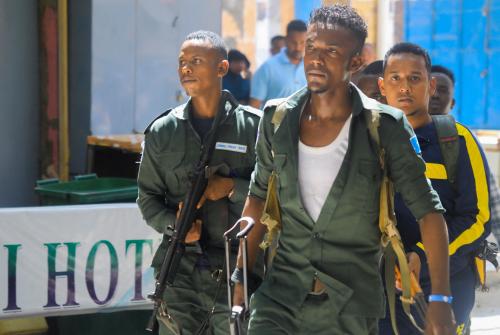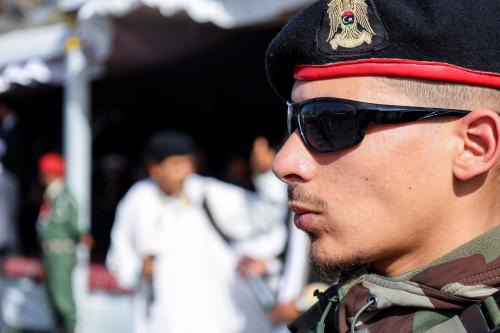The war in Yemen has one local winner, al-Qaida. The Saudis seem oddly unconcerned.
Since early April, al-Qaida in the Arabian Peninsula (AQAP) has controlled Yemen’s fifth largest city, Mukkalla, and much of the surrounding governorate of Hadramawt. The Hadramawt is Yemen’s largest governorate and home of about one-third of Yemen’s oil production before the war. Mukkalla is the country’s second largest port on the Indian Ocean after Aden. Hundreds of AQAP supporters have gone to Mukkalla after jail breaks in other parts of Yemen since the start of the war.
AQAP rules Mukkalla in association with other local Salafist groups. Initially, it avoided imposing strict Islamic law to keep public support. It officially banned qat chewing, the drug enjoyed by most Yemenis, but enforcement was apparently nominal at first. Now, AQAP is becoming more rigorous — religious police enforce strict rules on behavior, Sufi religious sites have been destroyed, and the ban on qat is becoming more strict.
AQAP faces opposition in Hadramawt from the Islamic State, which has carried out small attacks there. Northern Hadramawt is controlled by Yemeni army forces loyal to former president Ali Abdallah Saleh, but they generally avoid conflict with AQAP.
American drones have struck al-Qaida targets in and around Mukkalla with significant success since April, including killing AQAP leader Nasir Al Wuhayshi in June. Wuhayshi reportedly was not targeted specifically; a so-called signature strike killed him. He was immediately replaced as emir of the group by Qasim al Raymi, the military commander of AQAP. He was involved in the 2009 attempt to blow up an airliner en route to Detroit from Amsterdam on Christmas Day.
From its base in Hadramawt, AQAP carries out deadly terrorist attacks on Houthi targets in Sanaa and other cities. Using the base in Mukkalla, the jihadists target Shia mosques, Houthi leaders and patrols, and other targets.
Since the start of the Yemen war, the Royal Saudi Air Force and its coalition partners have not targeted AQAP’s Hadramawt emirate. It has not been subjected at all to the bombing other Yemeni cities are enduring. As a consequence, Yemeni internally displaced persons have sought shelter and protection in Mukkalla. The port has also remained open for some traffic unlike ports controlled by the Zaydi Shia Houthi rebels.
Riyadh’s apparent willingness to tolerate an al-Qaida stronghold on its southern border has raised conspiracy theories in Yemen that the Saudis implicitly at least welcome AQAP as an ally against the Zaydis. There are also longstanding suspicions that the Kingdom would like to annex Hadramawt to give it access to the Indian Ocean and a route for an oil pipeline to Mukkalla that would allow oil to reach the sea without transiting the Straits of Hormuz.
AQAP now sometimes calls itself “the Sons of Hadramawt” — perhaps to secure local support. It has not abandoned its global jihadist agenda, however, nor its animus toward Saudi Arabia. It is a safe assumption that AQAP’s master bomb maker Ibrahim Al Asiri has his lab somewhere in the Hadramawt preparing more attacks on America and the Kingdom.



Commentary
Al-Qaida’s Hadramawt emirate
July 12, 2015